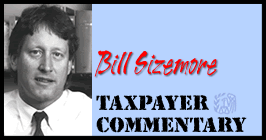REFORMING THE WAY PUBLIC EMPLOYEES ARE PAID
By Bill Sizemore
March
12, 2010
NewsWithViews.com
Public employee compensation is breaking the bank. Two or three decades ago, it was commonly understood that public employees were underpaid; everyone knew that when they took a government position. The lower pay was balanced by job security, extra days off, and a generous benefit package, so government employers were able to attract qualified applicants in spite of the lower salaries.
Then, state by state, city by city, public employees were allowed to unionize, which – in hindsight – was perhaps the biggest fiscal mistake governments could have made. Predictably, public employee unions (PEUs) began to involve themselves in politic campaigns and amass enormous campaign war chests and eventually began electing the very people with whom they were negotiating their contracts.
If unions attempted this in the private sector, it would be a felony and people would go to prison…but almost no efforts have been undertaken to prevent this form of “bribery” in the public sector and today public employee unions routinely control both sides of the bargaining table.
Under this perverse new system, public sector salaries have grown until they are at par or greater than the salaries of similar job classifications in the private sector. However, these higher salaries are in addition to vastly superior, public sector fringe benefit packages.
Today, public employees in Oregon enjoy the best fringe benefit packages money can buy and, in addition to high salaries and first class fringe benefits, they routinely retire making more money in their pension than when they worked full time. Seriously.
In 1994, I sponsored a measure to protect Oregon taxpayers by reining in the Public Employee Retirement System (PERS) and ending the unrealistic eight-percent-guaranteed rate of return on the PERS investments, a benefit that employees were using to milk the system of billions of dollars.
Oregon voters approved my measure, but the Oregon Supreme Court ruled in a four-to-three decision to overturn the will of the voters, creating an “implied contract” out of thin air that neither the voters nor the legislature could alter, even if the cost of this court-created right would bankrupt the state.
Today, taxpayers in Oregon (and other states) are forced to fund top-notch health benefits and gold-plated pensions for public employees who are no longer underpaid, but in fact are also being paid first-class salaries.
The situation is growing increasingly dire and the governor, state legislature, and local government officials are unable to address the runaway cost of public sector fringe benefits and pensions, because judges, who are incidentally PERS participants themselves, have tied their hands. Oregon is on the verge of being as bankrupt as the State of California and out-of-balance public sector compensation is the primary contributing factor.
This is a much abbreviated summary of how we got into the mess we’re in today, with public employee unions owning the offices of governor, attorney general, secretary of state, state treasurer, and superintendent of public education. The public employee unions have hand-picked the people who currently hold those offices, financed their campaigns, supplied their volunteer campaign workers, then after the election, sent some of their own people to work in those offices to insure that their bidding was done.
The current Democrat governor unashamedly announced on election night that he owed his victory to the public employee unions. He then appointed the teachers union’s top lobbyist to be his chief of staff…the former president of the AFL-CIO to be his deputy chief of staff…and the woman who ran the unions’ professional blocking teams to be his communications director!
In other words, after the election, the public employee unions took over the governor’s office.
The current attorney general, whose campaign was funded almost entirely with public employee union money, immediately put on staff the unions’ own lawyer, the same one who directed the unions’ legal efforts to stop or sabotage my tax-saving initiatives. This same lawyer now signs the letters from the Department of Justice, telling our side that they will not even allow us to collect signatures for our measures. The public employee unions own the office of attorney general and are using that office to wage political and legal warfare on their political enemies.
The current system with all of its built in conflicts of interest is obviously broken. We cannot continue on our current path or the state will become bankrupt. Thankfully, there is a better way.
A new and empowering way to pay public employees
Currently, it is all but assumed that taxpayers will automatically pay public employees higher salaries than those employees enjoyed under their previous collective bargaining contract, and on top of those salaries pay the full bill for the employees’ generous health benefits and retirement plans.
Because governments have neither a bottom line nor a need to controls costs and become more efficient, at the bargaining table government officials or their agents almost always cave in to union demands, leaving the taxpayer with holding the bag.
But, what if we changed the formula a bit? What if the total compensation package was one specific amount, an amount that was competitive with the private sector? Each government employee could decide precisely how much of that total package would go to salary and take home pay, and how much would be allocated to health insurance and retirement?
A young couple with no children and in good health could decide to receive more take home pay and as a trade-off accept a less costly health insurance plan. The additional take home pay might enrich their lives more than the costly but unnecessary health benefit they currently receive.
On the other hand, an older employee who perhaps owns his or her home outright and has no mortgage to pay, might choose to receive less take home pay and instead sock more money away in his or her pension or perhaps buy supplemental health insurance.
Under this plan, employees would be empowered to choose a compensation package that is best for their particular needs.
Under this new system, when the PERS fund performs poorly, taxpayers might still be on the hook contractually to pay the eight-percent-guaranteed rate of return, but an employee who demanded the artificially high return on his retirement account would see his salary for that year commensurately reduced.
On the other hand, the employee could voluntarily forego the guaranteed rate of return, preserve his or her salary for the year, and hope to make up the loss on investment in a future year when the fund’s investments fare better than the guarantee, which incidentally happens often.
The truth is, the salary portion of the employee’s compensation is negotiable. The court may have locked taxpayers into paying obscene pensions to employees, but it cannot lock taxpayers into also paying ever-increasing salaries.
Note: The court’s 1995 decision declaring public sector pension benefits sacred and untouchable was wrong-headed and contradicted all previous decisions by the same court regarding such contracts; however, that decision is now “law” in Oregon. That fact currently leaves taxpayers and government employers with only two choices: (1) pay the extra amount necessary to make up for the PERS’ shortfalls, which requires either a reduction in services to the public or an increase in taxes, or (2) reduce public employees’ salaries to help absorb some or all of that increased cost.
By the way, one proof that the court’s decision was wrong-headed is the obvious freedom the federal government has to raise the eligible retirement age for social security, forcing workers to wait longer to retire. If retirements were indeed sacred and untouchable, we would all be able to sue the federal government for breech of contract for changing our retirement age. (Good luck with that.)
Conclusion
Under the system I have proposed, governments once again would be able to control their budgets and not be at the mercy of market fluctuations that sometimes create PERS shortfalls of tens of billions of dollars. Instead of being forced to decide between increasing taxes or laying off teachers and prison guards, part or all of the cost of pension shortfalls in bad years would be absorbed by those who also gain when investment returns are higher than expected.
Public employees could still have the exorbitant pensions they were promised, but they would be required to help fund them…or if they preferred they could forego some of the pension excess and keep their full pay. The choice would be theirs. (Readers should know that for some years the return on PERS investments is more than 20 percent for a single year. If all or most of that return is allocated by the PERS board to the employees’ retirement accounts for that year, taxpayers are still on the hook to pay the eight percent guaranteed rate of return the next year, even if the fund loses money that year and even though the average for the two years was well in excess of eight percent.)
| Subscribe to the NewsWithViews Daily News Alerts! |
The current system is rife with conflicts of interest and is grossly unfair to taxpayers. Paying public employees one total amount that is competitive with private sector compensation and letting each employee decide how they want to allocate that amount among their salary, health insurance, and retirement benefits would at once empower individual public employees and protect taxpayers and government budgets from retirement costs that are entirely unsustainable.
Bill Sizemore is a candidate for the Republican nomination for governor of Oregon. His email address is bill@otu.org
� 2010 Bill Sizemore - All Rights Reserved













 Share This Article
Share This Article





